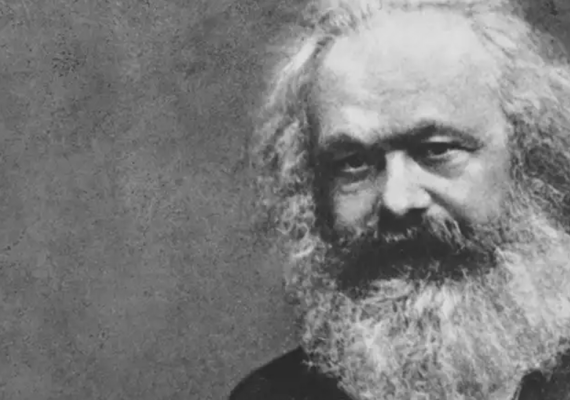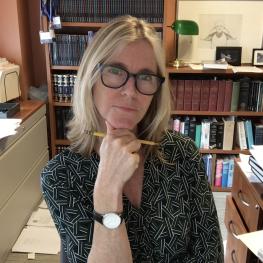JQR Contributor Conversation: Samuel Hayim Brody on Jewish Studies and the History of Capitalism
JQR editor Natalie Dohrmann chats with contributor Samuel Hayim Brody about Jewish studies and the history of capitalism.

The spring issue of JQR (110.2) features an essay called “What Great Transformation? Continuity, Rupture, and Capitalism in Twenty-First-Century Jewish Studies,” in which author Samuel Hayim Brody observes that historians of Judaism tend to exempt capitalism from their assessment of the radical impact of modernity on Judaism. Traditionally blended with ideas of trade and monetary life more broadly, capitalism has been essentialized and dehistoricized by the scholarship, and treated as a continuous unchanging element of Jewish social existence. In this its treatment mirrors the ways Jewish ethics is also seen to encompass timeless concepts. Brody argues that this is a misreading of capitalism and history, and asks what is missed when capitalism is not understood to be a symptom of modernity radically different from markets and money in premodern times.
The essay is paired with a review essay by Flora Cassen of recent titles on “Jews and Money,” and represents growth in economic approaches in the humanities. JQR editor Natalie Dohrmann asked Sam to reflect on the field for our blog.
NBD: Your work on Judaism and capitalism is part of a growing interest in the history of capitalism, Penn’s new journal on the topic being just one data point. Why now?
SHB: I think of academic trends as much, much slower fashion trends. The initial spike in interest happened over ten years ago, in the wake of the 2008 financial crisis. That took the form of renewed attention in history departments, especially among American historians, who inaugurated a “New History of Capitalism.” Of course, the essays and books written from that new interest didn’t come out until 2010, 2012, 2014… That’s the academic calendar. And then the responses to those, the appreciation of the trend and/or warnings about its direction, appeared in 2016, 2017, etc. From my perspective the movement gained more urgency after Brexit and Trump, because it seems so clear that far-right nationalism around the world is responding to global economic trends that cannot be accounted for on micro-scales.
But you also have to account for resistance. Methodological preferences in the humanities and even to some extent the social sciences have militated against Grand Narratives for decades now, creating institutional pressures that put the brakes on any movement to study capitalism, which is inherently perceived as a Grand Narrative. There’s also been a steady marginalization of economic history, which has been almost totally discarded by economics departments and not treated wonderfully by history departments either. That’s significant because economic historians are slightly more likely to buck the methodological prejudice against “capitalism” as a category, or at least to be more interested in having the discussion. But despite this general marginalization, economic history—really good economic history—is actually fairly prominent within Jewish Studies, which is interesting and is one of the things that drew me to this topic.
NBD: Jewish studies has shied away from studies of Jews and capitalism because of its association with antisemitic tropes. How does this association figure into your own work on this topic?
SHB: First and foremost, it offers an explanation for the trajectory of studies in Jews and economies in the postwar period, which is something that a number of the scholars I cite (like Jonathan Karp and Derek Penslar) have discussed very well.
Beyond that, I think the negative associations form a kind of polemical field that’s hard to escape. You have to situate yourself in relation to it, even if you want to shake it off. That gives readers a lens through which to examine the more recent scholarship: what is the author’s relationship to this history? What avenues do they see as most closed off by it, which they’d like to open again? Or conversely, what dead ends do they think it led to, which we should turn back from?
NBD: You find significant the methodological parallels between the history of ethics and the history of capital. Can you say more about why these two fields should be juxtaposed?
SHB: I’m fascinated by the relationship of ethics to history. As I talk about in the essay, there is a certain extent to which we want our ethicists to have a license to dehistoricize, and to read contemporary significance out of ancient texts. That’s their whole purpose. But on the other hand, if they get too anachronistic, the reader sees through it and the project fails. There’s some kind of alchemy to finding that perfect midpoint at which just enough history is accounted for in order to make contemporary readings of ancient texts possible and relevant. And I think a knowledge of the history of capitalism is necessary to that alchemy, and is a factor that has been somewhat neglected in recent Jewish economic ethics. As a result of that, I often find myself frustrated when reading that literature, because it will offer some hand-wavey acknowledgment of ways in which the ancient Israelite economy is of course so different from ours, and so was the Roman Palestinian one, and so was the Sasanian Babylonian one, but then these differences ultimately don’t really matter to the analysis. To me that drains ethics of a lot of power that it could potentially have, and I would like to see it have that power.
NBD: What do scholars of religion miss if they do not understand economics/economic history? Or more positively asked, how does a knowledge of economics add to the work of doing religious studies broadly and Jewish studies in particular?
SHB: The easy way to answer this would be to say that it’s just one more facet of interdisciplinarity, which many of us prize and which is usually included in the definition of Jewish studies as a field. But I also suspect that there’s something much deeper going on in terms of the history of all of our disciplines, which lies at the very heart of the divisions between the different humanities fields and the division between the humanities as a whole and the social sciences. Whenever a new field is created, it makes two claims: that X is its subject matter, and that X is, at least to some extent, not the subject matter of other fields. In practice, things are much messier, but there is some level at which we all respect this basic claim. This only becomes a problem when we forget that our fields are ultimately heuristics for organizing knowledge and not truly defined territories. In some sense, the early sociologists like Weber and Durkheim, whom we still teach today even if we no longer accept many of their conclusions, were experts at remembering this and that’s part of why their work is so rich.
Jewish studies has always been disproportionately a project of historians and literary scholars, and this is still true even though more recent years have seen a welcome increase in the numbers of anthropologists, sociologists, and political scientists in the field. And although historians don’t necessarily exclude anything a priori from their purview, there are trends that determine what is foregrounded for each scholarly generation. We learn these in graduate school when we learn about social history, cultural history, and “the new” iterations of these, and then we forget later on. History in general doesn’t like to theorize about itself in the way that anthropology or literary theory do. So I think economic history offers a reminder to historians at large about the choices they’ve made in terms of genre and theory.
My own entry point into looking at economics and economic history comes as a continuation of my last project, which was on the concept of theopolitics in Martin Buber (1878–1965). Buber was always questioning the boundaries between politics and ethics, and between theology and philosophy. This questioning meant not just disputing who was qualified to speak on each subject, but also what counted as part of each subject. Who decides “this is ethics, not politics?” What definition allows us to draw the line? In ordinary language, much of the content of “politics” is economic, yet professional political theorists and professional economists are often the most committed to denying that this is the case. And sometimes historians reflexively respect these boundaries when it’s their own turn to address these subjects. So it seemed natural to me to turn to economics next.
NBD: Do you want to venture anything about this moment in the history of capitalism and the history of Judaism?
SHB: It feels like we are at the close of an era that we are right now gaining the ability to look back on and define as an era. From the mid-70s to 2016, say. Some might call it the neoliberal era, although the usefulness and meaning of that term are disputed. And I think that as we do the work of defining that era, we’ll notice that trends in scholarship and trends in the economy have something to do with each other. Not in the bad old determinist way, but in a very practical and matter-of-fact way, and we’re going to want to address that.


